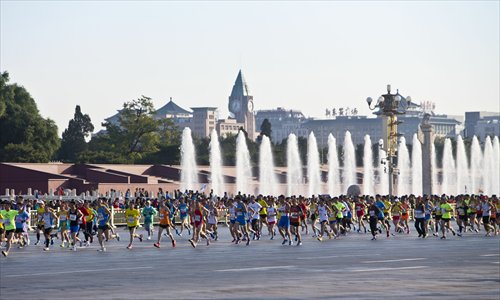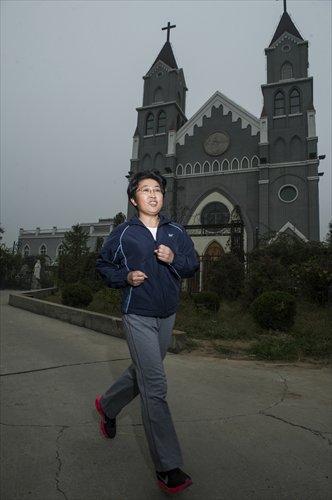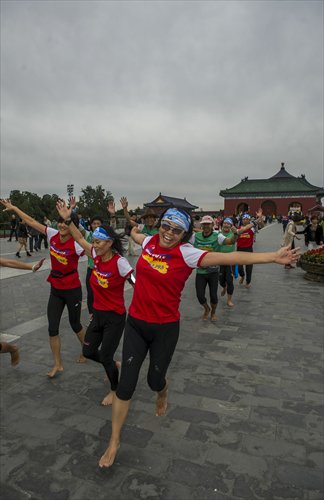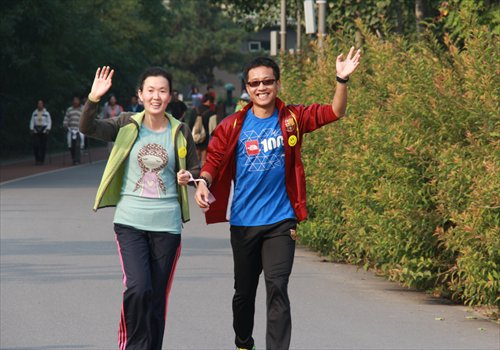Born to run
Meet the extraordinary runners of the upcoming Beijing Marathon

Runners at the 2013 Beijing Marathon. Photo: CFP

Sister Hu Huiqing jogs past the Changxindian Catholic Church in Beijing's Fengtai district. Photo: Li Hao/GT
At the brick and stone walkway of the Vermilion Steps Bridge in front of the Good Harvests Altar at South Beijing's Temple of Heaven Park, a group of about 15 barefooted runners set off on a jog.
"We run for a healthy life," they shouted, many of whom were adorned with blue headscarves. Coming from all walks of life, from young office workers to middle-aged chengguan (urban management officials) to an elderly 82-year-old grandfather, they stood in stark contrast to the people around, who had bundled up to protect themselves from the cold gusts of the late fall afternoon.
"We gathered here to train for the marathon on Sunday. This is going to be my first Beijing Marathon," said 43-year-old Ge Zhiyong, a sinewy man of average height among the group. "Barefoot running has changed my life."
The group of barefoot runners are among 30,000 runners who have registered to run in the annual Beijing Marathon on October 19, which starts from Tiananmen Square and passes by some of the city's main scenic spots.
Now in its 34th year, the Beijing Marathon is one of the most iconic public sporting events in the city. When it was first launched in 1981, only 188 professionals - all men who were professional runners - were permitted to compete. Professional women runners were invited to join in 1989. And in 1998, the event was opened to amateurs.
Fuelled by an increasing enthusiasm for running among urbanities in China, over the past two years the number of marathon participants have soared.
Now, the vast majority of runners in the marathon are avid amateurs. While many of these runners will be keeping tabs on their time, it is widely acknowledged that simply to finish a marathon is a major achievement in itself.

Beijing's barefoot runners train at the Temple of Heaven Park in preparation for the Beijing Marathon on October 19. Photo: Li Hao/GT
Barefoot runners
Before Ge took up barefoot running, he was on the brink of depression. He had been unemployed for 7 years, with his life instead dominated by one ever-present task - caring for his father who suffers from uremia.
"I quit my job so I could devote all my time to my father. I didn't marry. Every now and then I would feel so helpless and isolated," Ge recalled.
In March, Ge was invited by a friend to join a barefoot run.
"I was suffering from plantar fasciitis in my feet, and so it always hurt when I ran. But I found that there was no pain if I ran barefoot. So I began training regularly with my friend."
While some may find running barefoot to be a little strange, Ge dismissed any skepticism.
"They've never done it themselves, so their opinions are nonsense," he said.
In May, Ge finished his first barefoot marathon at 3 hours 45 minutes after two months of training. "In a marathon, the longer you run, the more free and relaxed your feet feel. However, when running barefoot, you have to pay close attention in order to avoid stepping on something and damaging your feet," he said.
Thanks to running, Ge said, he is now part of a small community that has allowed him to reconnect with society.
"I now have peers and friends. I feel like I've rediscovered my life."
Han Liru, leader of the barefoot runners' group in Beijing, said that more than 150 runners will run barefoot during this year's Beijing Marathon. There are more than 600 barefoot runners in 18 runners' clubs around China.

Visually impaired runner Zeng Xin and her guide Zhang Peng training at the Beijing Olympic Forest Park. Photo:Courtesy of Zhang Peng
Running nuns
Every evening since July, Sister Hu Huiqing, a nun at the Changxindian Catholic Church in Beijing's Fengtai district, has gone running at a nearby park.
Hu is participating in this year's Beijing Marathon as part of the nationwide Sisters' Run program, which was launched in 2009 by the Jinde Charities Foundation. The program is dedicated to raising money to help the disabled, the impoverished and those who have been infected by HIV.
The 43-year-old nun has entered the 10-kilometer-run category in this year's marathon in the hopes of raising funds for the Jinde Nursing Home where she works.
"I had no interest in running before. But since there was no one else in the church who could run a marathon, I decided to volunteer. I also managed to persuade another 20-year-old sister to join," said Hu.
When she first started training, she could barely run for five minutes without stopping. When she finally managed to run 700 meters, she said she felt "so happy." Gradually, her strength and endurance increased, and now she can run for 80 minutes without any breaks.
"Training for a marathon has been a breakthrough for me. I am challenging myself in a way that I haven't for decades," she said.
"By running, I find that I'm still quite young. I'm going to keep at it and I hope I'll be able to run a full marathon in the future."
Defiant diabetics
By entering her first Beijing Marathon, Zhang Qi, 44, hopes to prove that "people with diabetes can do the same things that healthy people can."
Zhang, who works at the Beijing Children's Hospital, is the leader of a group of 12 runners who suffer from type 1 diabetes. With ages ranging from 12 to 45, the group has entered into the 5-kilometer-run at the marathon.
This will be the first time in China that a group of people with diabetes take part in a marathon to draw public attention to the illness, according to Zhang.
Zhang was first diagnosed with type 1 diabetes when she was 7 years old. Along with the other diabetics taking part, her training has been overseen by a panel of medical experts.
Zhang and her fellow runners with diabetes have been training since September, and regularly share their training logs with each other via social media platform WeChat to encourage each other to keep working hard.
In China, people with type 1 diabetes have been discriminated against in the past due to a lack of understanding about the insulin injections they must take daily. Those with type 1 diabetes are not allowed to hold a number of jobs in the civil service or at schools.
"In the past, type 1 diabetics in China tended to hide their illness from the public, for fear that they would be denied opportunities to study, work or get married. They were like ostriches burying their heads in the sand," said Zhang.
Zhang sees entering the Beijing Marathon as a way to overturn negative stereotypes.
"We have a 13-year-old who has bravely declared in public that she is a type 1 diabetic. I don't know what the future has in store for her, but she is very brave. We hope the public can give us the opportunity to live a free and equal life."
Dream helper
Zeng Xin, 35, previously thought that she could never be a runner. Zhang suffers from a visual impairment that means she can barely see when she runs.
"I was too afraid to run," said Zeng, who works for the Beijing Hongdandan Education & Cultural Exchange Center.
However, this year, she has been given the chance to realize her dream of running in the Beijing Marathon, thanks to the help of a volunteer provided by the center who will guide her through the run.
"This is my first time running. It is going to be 5 kilometers," said Zeng. "Previously, the only physical activities I've done are simple exercises."
So far this month, she has trained twice with her guide, Zhang Peng, a civil servant, at the Beijing Olympic Forest park.
"The first time, we ran arm-in-arm and I could feel a sense of safety. The second time, we ran with a ribbon connecting our wrists. Initially, it was scary, but I gradually got used to it."
Zeng hopes that the Beijing Marathon will just be the beginning, and she has already started thinking about other marathons she would like to participate in around the world.
To better help Zeng, Zhang Peng, an avid runner who will also participate in the full 42-kilometer distance section of this year's Beijing Marathon, has tried to figure out ways to assist the blind runner. "I describe things to her as we pass by, so she can feel the course," said Zhang Peng. "While we run, I always talk to her and based on her response I can get a sense of her physical condition. If she's breathing hard, I slow down."
Zhang's desire to help Zeng comes from his understanding of the spirit of marathon running. "I always see people help each other during marathons. If a person falls down, people rush to help him or her stand up. I also want to help others," he said.
"I feel I have the ability to help her realize her dream. I promised her I would take her to a marathon outside Beijing. If she doesn't give up, I'll bring her to many places in future," Zhang said.